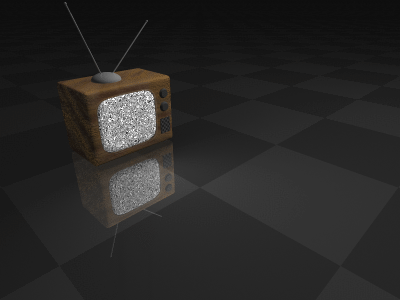Media alt text:
3D render of old tv set with animated static on its screen, as if tuned to a dead channel.
If you put a TV in a Faraday cage that blocked the relevant radio spectrum, would there be no static on it? I expected the answer to be a quick Google, but it wasn’t.
That is a good question, but I suspect if you tried this in real life it would still show static.
- The waves are amplified with a circuit that attempts to find a signal even if it’s very weak (so you can get a picture even if you’re close or very far from the tv station)
- At a certain point, the electromagnetic field from the running TV itself would start to get picked up
I suspect a better thought experiment would be if you just disconnected the input and amplification circuit entirely from the CRT tube, in which case you would probably just get white as the electron beam scans back and forth without any modulation.
Let me turn that around:
Would a TV still show static if you disconnected the input and amplification circuit outside a Faraday cage?
Likely a uniform white picture since the impedance of the input wire is too high for ambient noise on the line to result in any differentiated interlacing.
Input yes, amplification no
It would just make a dot center screen.
You’d still see static from the TV itself and any radiation that passed in to the cage. It’s not a perfect EM blocking device like TV shows and movies would have you believe.
Even if the Faraday cage blocked all RF perfectly, the Johnson noise would still produce plenty of static.
Great experiment idea.
This is a very non scientific answer, but when I was a kid (good 40 years ago) I remember having a science book that called TV static “an echo of the big bang”. I guess that would mean just randomly scattered energy bouncing around on all bands?..
I could probably Google it and give you an answer, but I’ll just wait for someone with a more convincingly and authoritatively written reply.
Not all of it. But parts of it really are due to the cosmic microwave background radiation. Light from the moment the universe was transparent enough to let light spread. It’s from about 300,000 years after the big bang if I recall correctly. It’s the earliest image of the universe we have. And it’s more or less everywhere.
but I’ll just wait for someone with a more convincingly and authoritatively written reply.
Pfft sprayed my drink lol
Probably because of how accurate it is
If it was milk, you basically created tv static on a dead channel.
Now that you mention it, I remember something similar! I may have to follow up on that to see (but I’m also curious of others’ responses, hence asking).
Well apparently now astrophysicists are saying maybe the Big Bang didn’t happen. ¯_(ツ)_/¯
But it is still the result of background radiation, which is caused by something.
That’s false. Most of them still agree that Big Bang happened, it is just that the first extra small fraction of a second of Big Bang can’t be explained with our current understanding of physics, and there is still a lot of some unanswered questions about it.
deleted by creator
Since the last Lemmy update, if i delete a comment, it stays there sayin’ “deleted by creator”, just like yours.
Anyway, i wanted to see if I could still reply to a deleted message and I could, as i am writing this reply rn.
Very confusing for me is that, at least on my client on Android, your deleted message is displayed full and clear above the reply box.
Is this the intended behavior of deleted messages on Lemmy, it just hides the message, but it’s still available for anyone to read if they hit reply?
Uh Oh
Interesting.
deleted by creator
This has been bothering me too for some time.
IIRC, literally the background radiation of the universe.
Only a fraction, but yes. It’s cool to think those photons have been around since the universe turned transparent.
The TV will try and amplify and display any signal. Without a station, it will end up amplifying random radio noise and tiny fluctuations in the amplifier circuits themselves.
The momentary signal strength is interpreted as brightness of a spot which is rapidly scanned over the display. In this case the signal is random so every spot on the screen will be a random brightness, changing every frame.
Modern digital TVs won’t do this, because with compressed video recognizable data is needed to even attempt displaying a picture.
As for the sources of the radio noise, most of it is from electrons being jostled by heat, some from space. (Including the cosmic microwave background others have mentioned)
The electron jostling (thermal noise) is the reason the receivers on radio telescope as cooled to insanely low temperatures often with liquid helium.
This is the closest to the correct explanation. The reason televisions based on AM radio reception showed static is because of a circuit called the AGC (Automatic Gain Control) which worked like a robotic volume control. Its job is to keep the recovered video signal within a certain amplification range. As long as there was a carrier (the TV station was “on the air”), you’d see whatever the station broadcast. But when they turned off their transmitter, the signal strength would fall and the AGC would increase the amplification until what you see is white noise, mostly due to the random motion of electrons in the electronic components. We can minimize that by cooling, but it can’t be totally eliminated. Audio amplifiers often come with a “hiss” specification that tells you how much of this kind of noise you can expect at normal operating temperature.
BTW, modern digital TVs -will- show a noise picture if they lack a video muting function when no carrier is detected. I have an LG bought in 2019 that does this, and it’s hella annoying when I accidentally hit the input selection button on the remote, switching from HDMI to TV reception.
Waves are everywhere. The TV picks up whatever waves it can. Some of those waves are signals meant to transmit an image (eg from a broadcast tower), others are just random noise in our environment.
Not an expert, but that was my understanding
“Waves are everywhere” made me think of the Feynman’s “Seeing Things” video. “Tremendous mess of waves”
It’s been awhile since I’ve messed about with this, so I don’t remember (and you may not either, so this is an open question), but wouldn’t it produce the effect even if disconnected from an antenna?
If so…Would the same principle be in play of it picking up on general EM waves to cause the effect?
the effect can change slightly if you unplug or touch the antenna or the TVs socket for it, because it may change what contributes to the signal noise and how much. It can for example become brighter and the pitch of the audio noise can change.
Yeah, the same way a radio tuned to a station could be static until you plug in an antenna.
You could also get hums and interference from other sufficiently strong EMF sources, like how AM radios can pick up the sound of transmission lines
Your mom (or dad) using an electric knife to cut a turkey on thanksgiving would do the same. It was wild.
AM car radio can pick up the waves from your cars electrical alternator as well, which can cause the static to rise and fall in pitch as you speed up and slow down.
Afaik the antenna is picking up the background waves/radiation and the TV is displaying that background waves/radiation. If you disconnect the antenna, the TV will have no signal to display, it’ll be as blank as it can get.
Nah, the antenna is tuned to pick up vhf/uhf, but the wire / traces and even the legs of the amplifier are sufficient to pick up cmb
The display on the screen is the strongest signal. Without a strong signal from a TV tower, you just get noise from 60 Hz AC running through the wall, or radio towers, or power lines, or whatever else makes that radio noise.
“The sky above the port was the color of television, tuned to a dead channel.” W. Gibson.
It’s wild that this makes no, or little at most, sense to entire generations now.
What do you mean? It’s blue, right?
(It’s a joke. Don’t worry, I get the original meaning, I’m old.)
In another bit of poorly-aged prediction by Gibson, Case, the main character, brings some RAM with him to sell for a quick buck on the street. How much RAM? Three entire megabytes.
Yeah, but tbf, Case was pretty jacked up at the time.
Also, there’s a market now for obsolete stuff.

Here’s the real question: did Gibson write Neuromancer before or after Bill Gates said no one would ever conceivably need more than 640k of RAM?
I’m not sure, but I always found it mildly amusing that he wrote it on a manual typewriter.
IIRC, Gibson had never used a computer, at all, before writing Neuromancer. At most he’d seen some Apple II microcomputer affair sitting idle. Hence the cyberdeck design: compact, integrated, luggable, all solid-state components. When he finally used a PC he was primarily struck by how loud the damn thing was.
Ha I remember that. I also recall someone in the 80s there was a pop song popular in Poland, entitled “Glass Weather”. It was about these rainy autumn evenings when there’s nothing better to do than sit in front of your (black and white) TV. The lyrics were mentioning “apartment window blue from the TV glow”.
The cosmic microwave background?
Or any other waves around you
And in you heading to the tv.
By tv static, I mean like this btw:

There’s always more or less random noise, and that’s what you see and hear in analog systems. Random noise. As for why it isn’t in color, see: https://dsp.stackexchange.com/questions/46401/why-is-tv-static-noise-always-black-and-white
Ah luminance subcarrier signals . Makes sense.
It’s the echo that sings “I want my M-T-Vvvvvvvvvvv” right before the guitar riff kicks in.
https://en.m.wikipedia.org/wiki/Noise_(video)
There are many sources of electromagnetic noise which cause the characteristic display patterns of static. Atmospheric sources of noise are the most ubiquitous, and include electromagnetic signals prompted by cosmic microwave background radiation,[1] or more localized radio wave noise from nearby electronic devices.[2]
The display device itself is also a source of noise, due in part to thermal noise produced by the inner electronics. Most of this noise comes from the first transistor the antenna is attached to.[2]
I remember putting my finger near the CRT display of these televisions during the animated static and noticing the weird electrical tingle in my finger. I even did this with my hair. It was so fun… and also potentially dangerous.
Now that’s something I can’t replicate anymore with my modern telly.
Its just static electricity. Not dangerous at all and not exclusive to the scramble screen.
Copied from an old reddit post:
Old cathode ray tube (CRT) televisions have an electron gun which fires electrons at the back of the screen. And the screen is coated with phosphorus phosphors which emit light whenever struck by an electron. The side-effect of this process is that each electron increases the static charge of the screen, and over time as the image on the TV changes it increases the charge. Meanwhile, rubbing your hand, which has a slight negative charge, across the screen will remove some of this built-up static.
Good to know
i approve of British people and their television channels
I’m glad I had access to those despite living in Morocco
Cosmic microwave background. You are seeing the big bang.
It’s not static. It’s the ant attack.
I’m glad I’m not the only one. I remember people calling it “the ant race” when I was little (very early 90s), but no one seems to recall this.
Cosmic microwave background radiation - the remnants of the big bang.
and what happens if you broadcast static, like point it at a car thats blasting some shitty radio station, and you are transmitting that same frequency? the distortion will destroy their speakers.
I wish! The boy racers have no shame (and I might be an old curmudgeon)
John Wayne in a Blizzard. So said my dad.

















